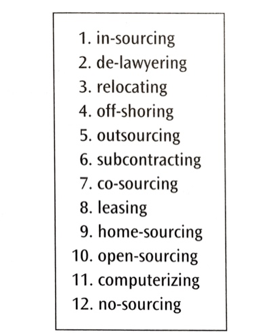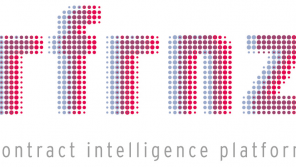by Zoë Andreae
In 2015, the German legal services market had total revenues of $22.7 billion, accounting for 14.1% of the European legal services market value and 3.8% of the global legal services market, which had a value of $593.4 billion in 2015 (MarketLine, 2016a, 2016b). Having been highly regulated for many decades, the (German) legal industry fits the classic profile of an industry on the verge of disruption.
Especially due to the regulation of the practice of law and the ownership of law firms the traditional business model of law firms has remained unchanged for many years. It is still largely based on leverage (ratio of partners to associates), information asymmetry, opacity (in transparence of the value creation), and the hourly-billing model.
Clients are mostly dependent on lawyers and their legal services, as they not only lack the license to practice law, but mostly the legal knowledge required to do so. This has allowed lawyers to capitalize on the information asymmetry between them and their clients by offering them customized solutions in a largely arcane language and an opaque process that is mostly inaccessible to clients. The opacity of the value creation process and the information asymmetry with respect to assessing the quality and value of the output has allowed lawyers to charge for their input, time, on an hourly-billing basis rather than for their output. Specific regulation in Germany requires lawyers to bill according to RVG (Rechtsanwaltsvergütungsgesetz), supposedly incentivising them to work more efficiently. Overall, these conditions have generally forced clients to rely on external quality indicators, such as reputation, educational pedigree, and even cost, when hiring legal professionals.
In contrast to the United States and many other countries, Germany’s permissibility of multi-disciplinary partnerships makes the German legal industry more liberalized than many other legal industries. A prominent example of such multi-disciplinary partnerships are the Big Four, each untertaking operations in the German legal industry already. At the same time, multi-disciplinary partnerships make the German legal industry more prone to disruptive market forces.
The digital transformation of the German legal industry has already commenced and is mainly being driven by the more-for-less challenge, liberalization, and the process of digitization.
Firstly, the more-for-less challenge has arisen as legal departments are under pressure to manage their costs, often being forced to cut 30% to 50% of their budgets, while the legal work to be done remains constant or is even growing. As a result, legal departments are increasingly demanding their external legal counsels to provide more high-quality service at significantly lower fees and with more transparency and accountability.

At the same time, legal departments have begun to slowly adopt new methods of sourcing legal services, as the real drive to cost reductiondoes not seem to be changing how legal work is charged, but rather sourcing legal services in new ways. According to Richard Susskind (Susskind, 2014), there are only two responses to the more-for-less challenge, the efficiency strategy and the collaboration strategy. The efficiency strategy involves the decomposition of legal services into different activities and the sourcing of those in the most efficient way to reduce costs. The collaboration strategy involves clients coming together and sharing the costs of legal services.
Secondly, calls for regulatory change and liberalization of the German legal industry to promote competition, reduce prices, and spur innovation have been increasing, as critics accuse the legal industry of being an unjustified monopoly that does not offer sufficient choice or access to justice to consumers by having anti-competitive working practices. In Germany, the permissibility of multi-disciplinary partnerships is not only opening doors for the Big Four, but is also enabling new legal business providers equipped with disruptive technologies, such as legal tech startups, to slowly make inroads to the German legal market.
Thirdly, the digitization of the German legal industry is the most profound driver of the digital transformation . As the digitization of the German legal industry advances, the other two drivers of the digital transformation, the more-for-less challenge and the liberalization, will be affected. Legal tech innovations will be able to meet the more-for-less challenge by facilitatingand accelerating the decomposition of legal services, and at the same time will facilitate and accelerate the liberalization of legal services, both through innovative legal tech solutions, such as platform models or legal high-tech tools.
Legal technologies are driving the digitization, and provide great opportunities for facilitating the decomposition and automation of legal services, for meeting more-for-less demands for greater efficiency and transparency, and for accelerating the trend of outsourcing legal services by leveraging platform business models that facilitate the interactions between different stakeholders. Legal tech startups that create and offer these legal tech innovations therefore affect and reinforce all three drivers of the digital transformation of the German legal industry and thereby accelerate it.
For more detailed information access the Master of Science Thesis by Zoë Andreae or reach out via LinkedIn or Email.
Sources:
MarketLine. (2016a). MarketLine Industry Profile Global Management and Marketing Consultancy. Retrieved from http://0-advantage.marketline.com.biblio.url.edu/Product?pid=MLIP2109-0005
MarketLine. (2016b). MarketLine Industry Profile Legal Services in Germany. Retrieved from http://0-advantage.marketline.com.biblio.url.edu/Product?pid=MLIP1950-0005
Susskind, R. (2008). The End of Lawyers? Oxford University Press.
Susskind, R. (2014). A Response to the More for Less Dilemma. The Practice, 1(1). Retrieved from https://thepractice.law.harvard.edu/article/speakers-corner-richard-susskind/
http://www.sikichtech.com/wp-content/uploads/2015/05/digital.jpg




